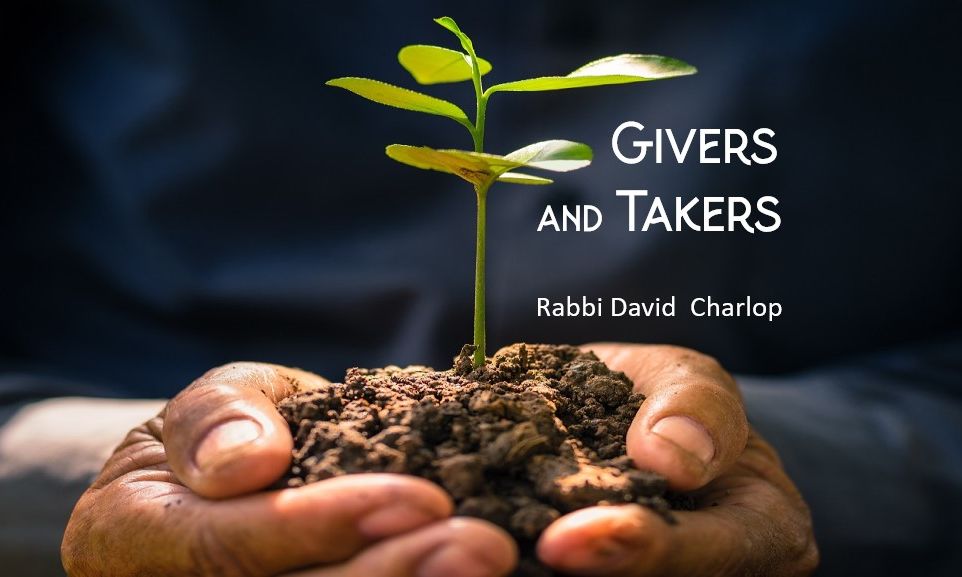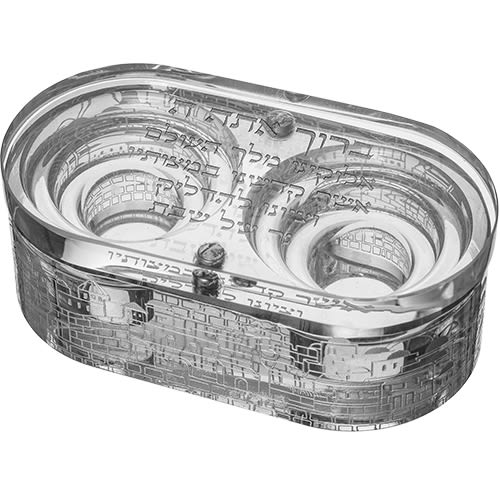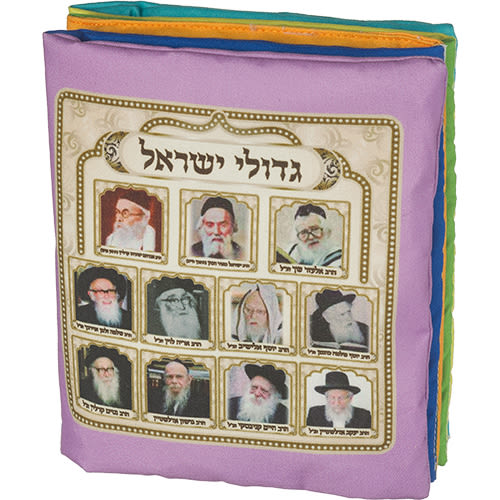
Nasso: Givers and Takers
Hashem gives is in order to have a relationship with mankind. Our job is to "give" Hashem the opportunity to share His good...

I recently came across a calendar of stunning pictures that captured scenes of breathtaking vistas as well as exquisite details of nature. On every page were words of ancient wisdom from the masters of far-Eastern thought. Primarily they reflected a wonderment of living in G-d’s world and a profound appreciation for its wonders. Honestly I was taken by the beauty of the pictures and the profundity of the words. Even so I felt that the world of pastels and tranquility captured in the calendar didn’t match up with how most of us relate to our day-to-day world. There was a second thought that struck me concerning the messages of this beautiful calendar that I wanted to share. In order to get there, let’s turn to this week’s Torah reading for an insight of the holy Rabbi Levi Yitzchak of Berditchiv.
Hands up, hands down. The hands of a person represent many lofty concepts. When someone’s hand is extended with the palm upwards, in general, this represents the concept of receiving. Many worthwhile charities illustrate their brochures with the picture of an extended hand with the palm upwards to signify their request for support and funding. Alternatively, the hand downwards represents the act of giving. Symbolically speaking, in this world Hashem’s “hand” is facing downward, constantly ready to extend blessing to His  creation. Our position on this planet is, in general, one of taking. Our hands are extended upwards to receive the incredible gifts that Divine bounty wants to shower upon us.
creation. Our position on this planet is, in general, one of taking. Our hands are extended upwards to receive the incredible gifts that Divine bounty wants to shower upon us.
For many of us, being takers is an uncomfortable position. The term “bread of shame” is based on a concept dating back to first man who wanted to earn his keep in this world by meriting the gifts bestowed upon him by his Creator in the Garden of Eden. However, that would mean that somehow he would be giving something to Hashem. Is that possible? It would seem that it isn’t possible. If so, was man doomed to cosmic selfishness vis-a-vis his Creator and the world? What about us? Are we destined to be takers and not givers? The prospect seems bothersome.
In this week’s Torah reading the Priests-Cohanim are commanded to bless the Jewish people. That blessing is given with their hands extended and their palms facing downwards. Why wasn’t their blessing sufficient without their extended hands?
The Talmud tells us that as much as a calf wants to nurse, to a much greater degree the mother cow wants to provide milk for her young one. If a calf had a sense of consciousness it might decide to nurse only to allow its mother to share her milk. Of course, a calf doesn’t have this sense of awareness and it only eats when hungry, but if it could we would understand this act, which looks like taking (nursing), as an act of giving (allowing the mother to give its milk).
By analogy, Hashem wants to give but He also wants us to be aware of the blessings He bestows upon us. In this case it’s obviously not for selfish motivations or self-aggrandizement. His giving is in order to have a relationship with mankind. However, in order for this relationship to take place we need to “give” Hashem the opportunity to share His good. We want to nurse from His good but more than that we want to be a conduit for mankind to connect to Him. In this situation taking is giving.
The Priests bless the Jewish people that we should be givers. We should bask in the blessings of this world but primarily our focus should be on acting selflessly and “allowing” Him to bring the flow of Divine bounty. The Priests extend their hands in a downward, giving position to teach us an essential lesson of the Jewish peoples’ relationship to Hashem. In turn, He will then give with an open hand extended downwards towards us.
Practically speaking how does this translate into real life? Many months ago we read the story about Abraham offering food to three wandering desert travelers. After performing circumcision on himself, Abraham was in the midst of a “visit” from Hashem who revealed Himself to Abraham to show His concern about his well being. When Abraham sees the guests, he takes leave of this encounter with Hashem and runs to invite them for a meal. Why did he leave the Divine Presence to perform this act? Abraham was in the middle of an esperience of feeling and connecting to Hashem’s presence. However, he was aware that if the travelers would pass by, he would lose an opportunity to share that connection for others. He gladly forfeited his awareness and connection in order to spread that opportunity with others. This was an expression of Abraham “giving” to Hashem by allowing Him to bring more awareness of His presence to the world even though it would have appeared as a sacrifice of a unique encounter.
Getting back to the calendar. My other observation was that it is wonderful to bask in the light and beauty of Hashem’s world. The calendar clearly reflected that beauty. Even so, for me, there is an underlying issue. Are we takers or givers? Are we just enjoying the beauty or do we elevate ourselves a step higher by providing an environment within ourselves to share G-dliness in this world. As breathtaking as many scenes of nature are, it pales in comparison with a people dedicated to give of themselves and focus on being conduits of Hashem’s blessing for all of mankind.
May we merit to be true givers in Hashem’s glorious world.











6/10/2014
Rabbi Charlop Is Rabbi David Charlop from the Norwood area of the Bronx? I was once at his home for a Shabbat meal. It is my loss I only went once. It was an honor to meet him.
6/10/2014
Is Rabbi David Charlop from the Norwood area of the Bronx? I was once at his home for a Shabbat meal. It is my loss I only went once. It was an honor to meet him.